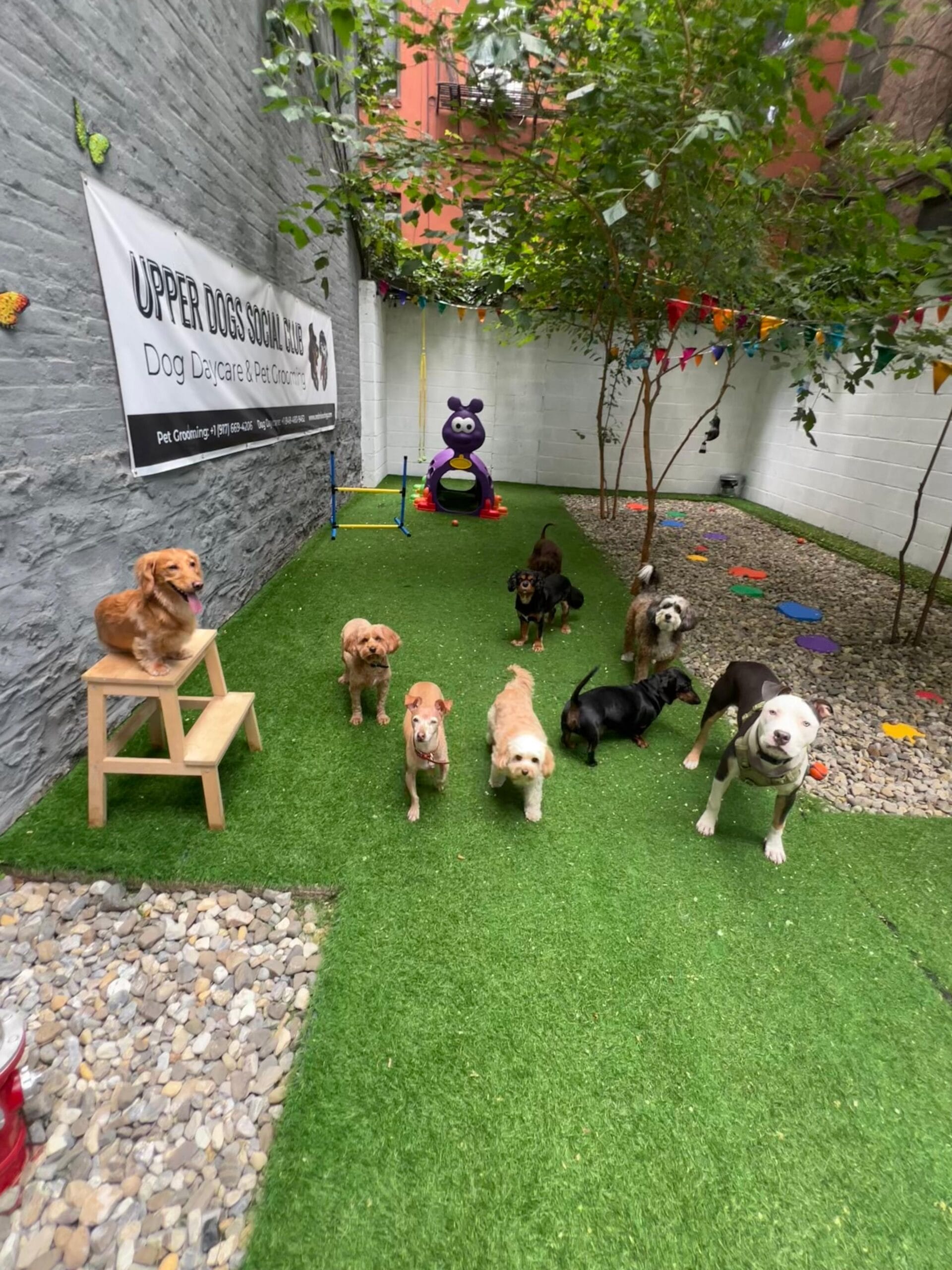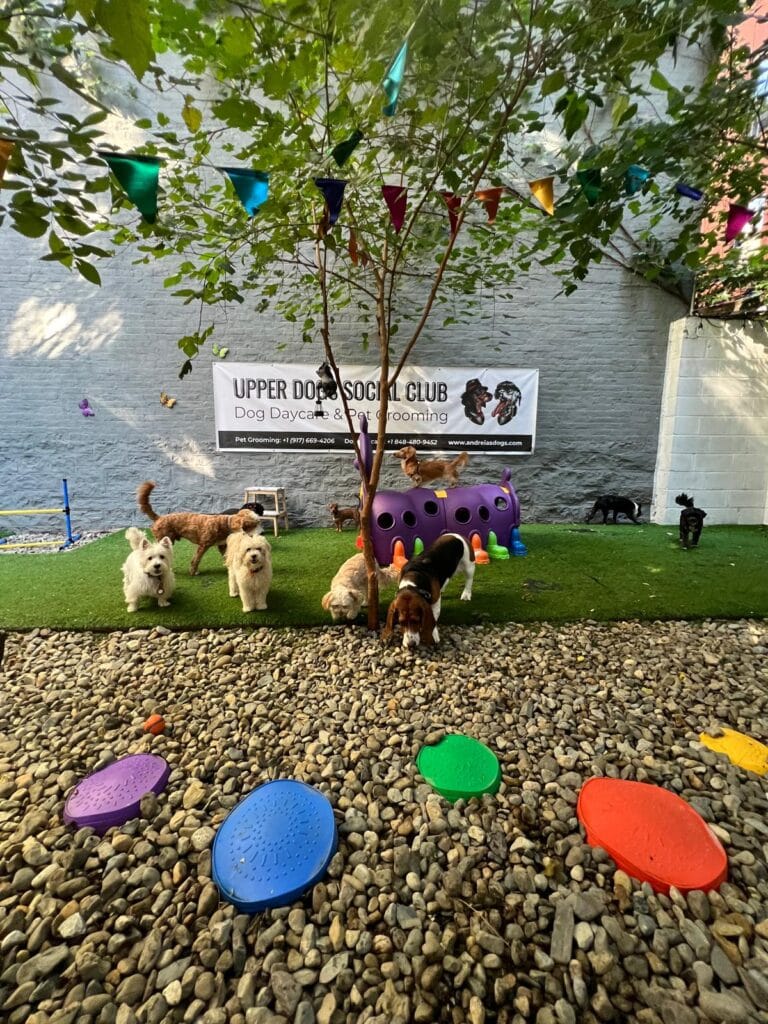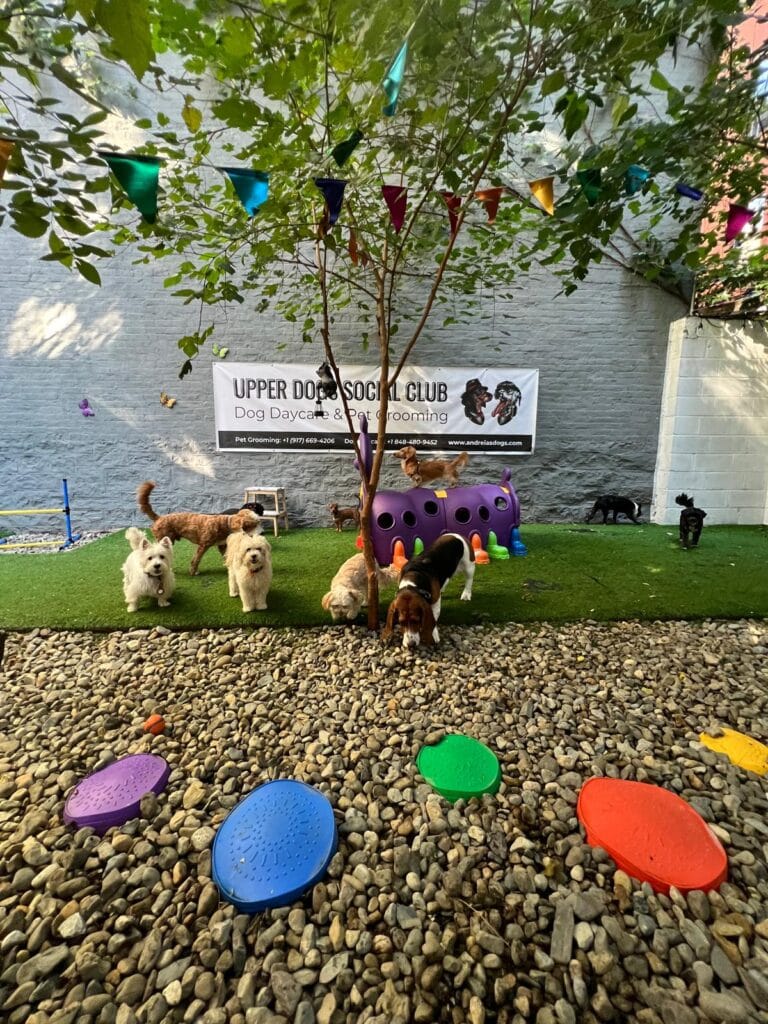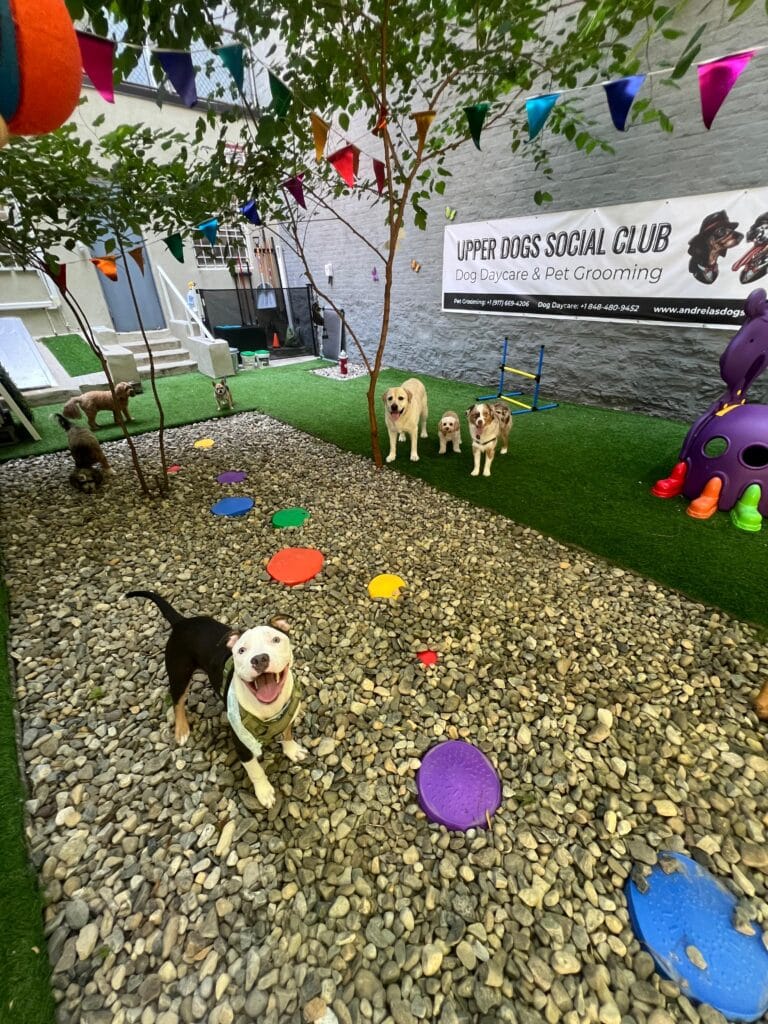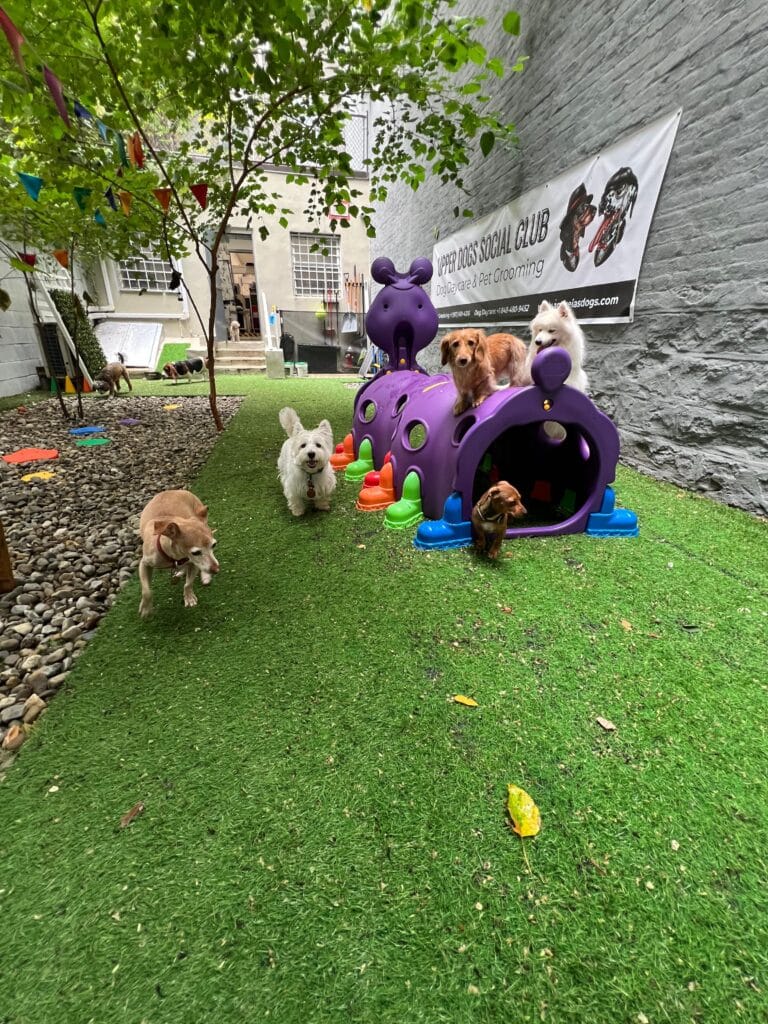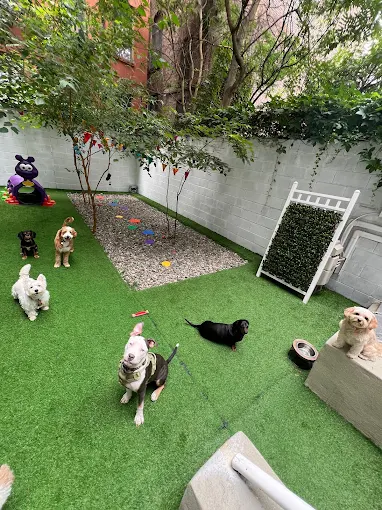Your NYC dog needs more than just daily walks to develop strong social skills in the bustling urban environment. Dog daycare offers busy pet parents structured opportunities for pups to interact with other dogs and people in a safe, supervised setting. PetMD highlights how regular daycare attendance can improve socialization, reduce destructive behaviors, and enhance overall well-being. If you’re searching for trusted options, consider dog day care in East Harlem at Upper Dogs Social Club
This guide is for busy Manhattan, Brooklyn, and outer borough dog owners who want their furry friends to become well-adjusted, confident companions. We’ll explore how professional dog daycare socialization helps anxious or overly excited dogs learn proper social cues and manners.
You’ll discover the core social benefits that come from regular daycare attendance, including reduced aggression and improved communication skills. We’ll also cover the specific structured activities that daycare centers use to shape positive behaviors and the lasting social improvements your dog will carry into everyday NYC life.
Understanding Canine Social Development in Urban Environments
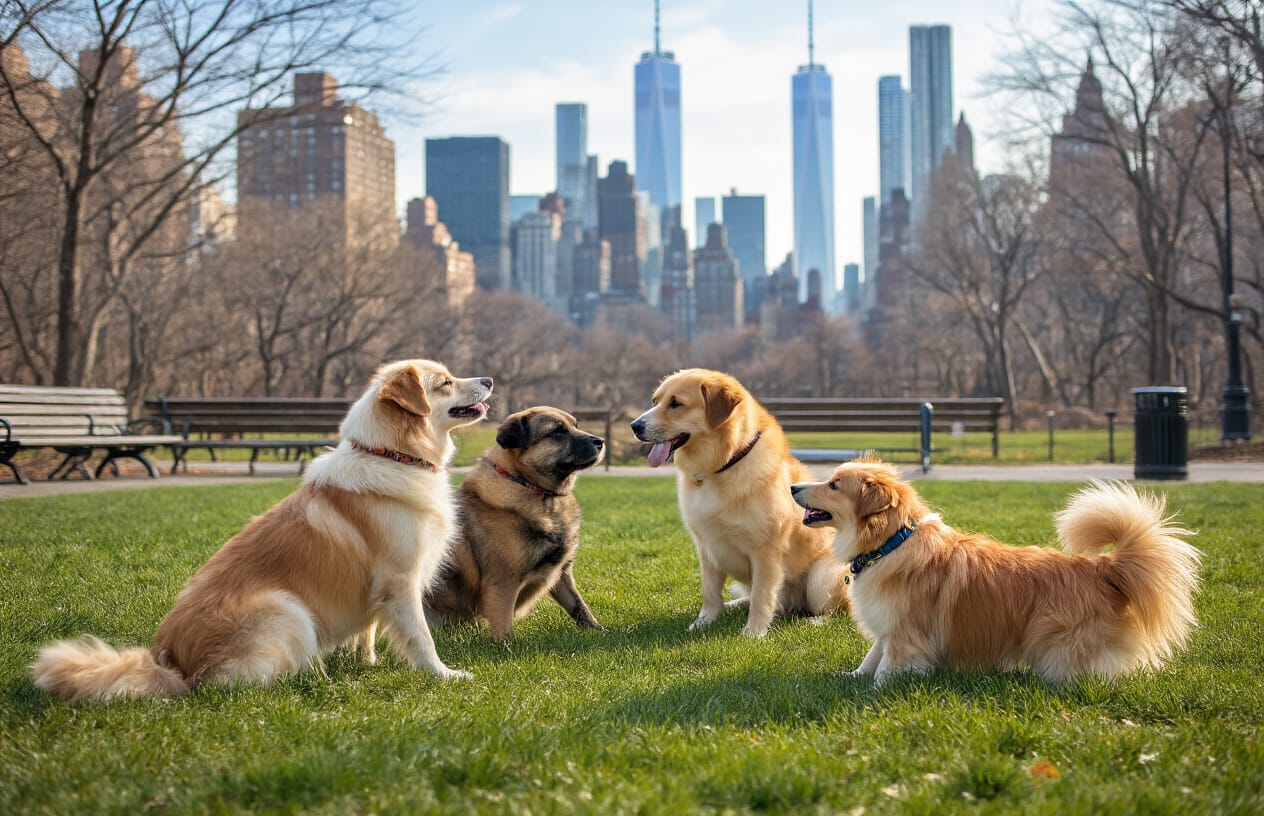
Natural Pack Behavior vs. City Living Challenges
Dogs evolved as highly social creatures, thriving in pack structures where they naturally learn communication, hierarchy, and behavioral cues from their peers. In the wild, puppies spend months observing and interacting with adult dogs, learning everything from play etiquette to conflict resolution through constant exposure to their pack.
New York City presents a drastically different reality. Most dogs live as single pets in apartments, missing out on the continuous social learning that shaped their species for thousands of years. The typical NYC dog might encounter other dogs only during brief leash encounters on busy sidewalks or hurried bathroom breaks. These rushed interactions rarely allow for proper canine communication – the sniffing, circling, and gradual approach that dogs need to feel comfortable with new companions.
Urban dogs often develop what experts call “leash frustration” – the inability to greet other dogs naturally due to the physical restraint and time pressure of city walks. This creates a cycle where dogs become increasingly reactive or anxious around their own species, making future interactions even more challenging.
Many NYC pet owners notice their dogs becoming overly possessive of them or developing separation anxiety – behaviors that rarely occur in dogs with regular pack interaction. Without the natural checks and balances that come from living with other dogs, single pets can develop behavioral quirks that would be quickly corrected in a group setting. For many urban dogs, regular socialization through daycare can help restore this balance — our guide on How Often Should Your Dog Attend Daycare in Manhattan NYC? explains how to set the right routine for healthy interaction and emotional stability.
Critical Socialization Periods for Puppies and Adult Dogs
Puppies experience their most crucial socialization window between 3 and 14 weeks of age, when their brains are exceptionally receptive to new experiences. According to the American Kennel Club, positive interactions during this period help establish neural pathways that influence lifelong social skills. Puppies who miss this window often struggle with dog-to-dog communication throughout adulthood.
However, socialization isn’t just for puppies. Adult dogs continue to benefit from structured social experiences, especially rescue dogs or pets who lived in isolation during their early months. Adult dogs who haven’t had regular social interaction can actually learn new social skills, though the process requires more patience and consistency than puppy socialization.
Dogs between 6 months and 2 years old are particularly receptive to social learning. This adolescent period, while sometimes challenging due to hormonal changes, represents a second opportunity to shape social behavior. Many dog daycare facilities in NYC report remarkable transformations in teenage dogs who initially arrived fearful or overly excitable around other pets.
Senior dogs also gain significant benefits from continued socialization. Older dogs who maintain regular social contact show better cognitive function and emotional resilience than those who become isolated. The mental stimulation of reading other dogs’ body language and engaging in appropriate play helps keep aging minds sharp.
NYC-Specific Social Stressors Affecting Dog Behavior
The urban environment creates unique challenges that can severely impact a dog’s social development. Constant noise from traffic, construction, and crowds creates a state of chronic low-level stress that makes dogs more reactive and less able to focus on social cues from other dogs.
Crowded sidewalks force dogs into uncomfortably close proximity with strangers – both human and canine – without the option to retreat or approach gradually. This violates dogs’ natural preference for controlled introductions and can lead to defensive behaviors that owners mistake for aggression.
The stop-and-go nature of city walks, with frequent interruptions for traffic lights and pedestrians, prevents dogs from engaging in the natural sniffing and circling behaviors they use to assess new companions. Many NYC dogs become “leash reactive” not out of aggression, but from frustration at being unable to greet other dogs properly.
Apartment living compounds these stressors by limiting dogs’ ability to decompress. Unlike suburban dogs who can retreat to quiet yards, NYC pets often have no escape from urban stimulation. This constant arousal makes it difficult for dogs to remain calm during social encounters.
Dog daycare facilities provide controlled environments where dogs can practice social skills without these urban stressors. To learn more about the premium facilities and safety measures that support this type of structured care, check out What to Expect from a Premier Dog Daycare in Manhattan. Professional staff understand canine body language and can intervene before interactions become negative, allowing dogs to build positive associations with their own species that transfer to street encounters.
Core Social Benefits of Professional Dog Daycare
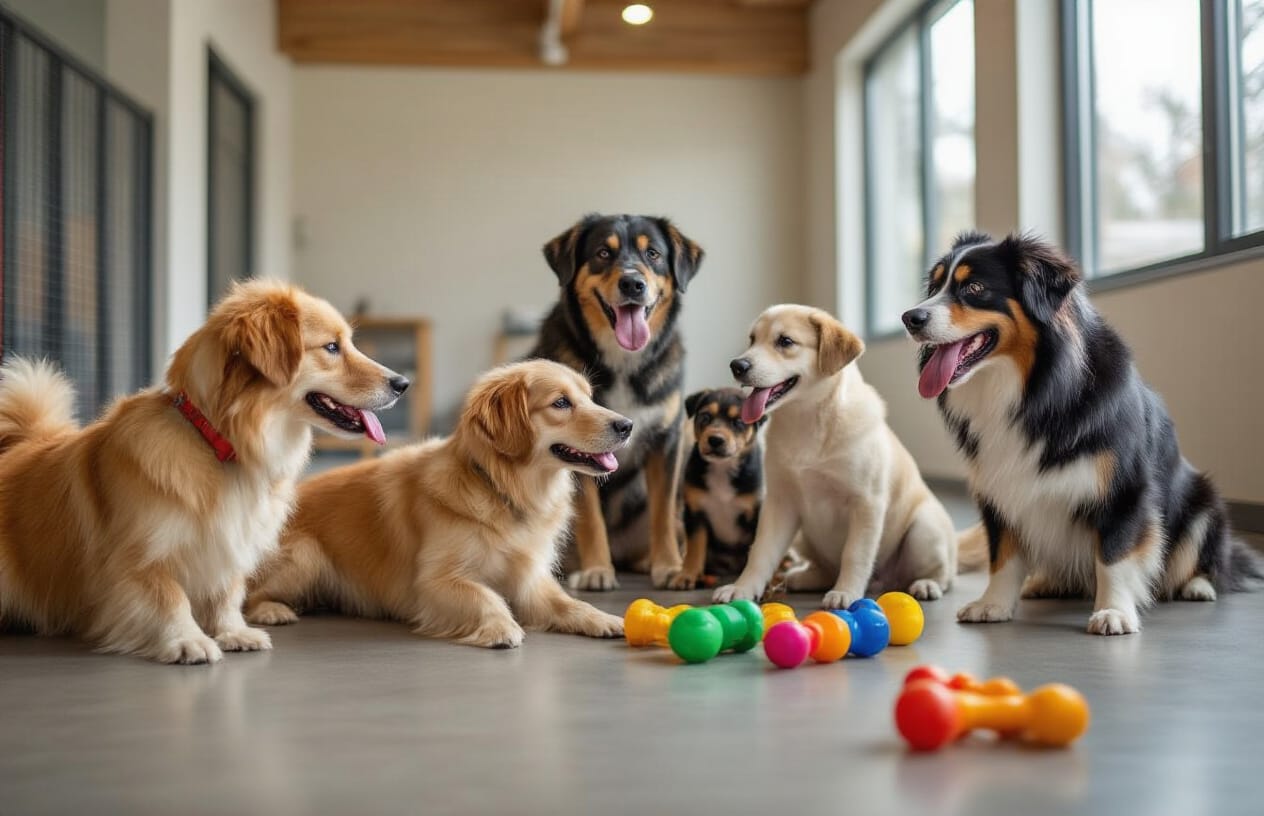
Supervised Peer-to-Peer Interaction with Diverse Dog Personalities
Professional dog daycare facilities in NYC create unique opportunities for your pup to meet and interact with dogs of all shapes, sizes, temperaments, and energy levels. Unlike casual dog park encounters, these interactions happen under the watchful eye of trained staff who understand canine body language and can guide positive exchanges.
Your dog learns to read social cues from a Chihuahua’s assertive personality just as easily as a gentle Golden Retriever’s calm demeanor. This exposure builds adaptability that serves them well in the diverse urban landscape of New York City. Dogs naturally become more flexible in their social responses, developing the confidence to approach new situations with curiosity rather than fear or aggression. The Humane Society of the United States offers guidance on promoting confidence and proper social behavior in dogs.
The mixing of different breeds, ages, and play styles teaches invaluable lessons about patience and compromise. A high-energy Border Collie learns to tone down their intensity when playing with an older, more sedate Basset Hound. Meanwhile, shy dogs gain courage by observing confident pack members navigate social situations successfully.
This controlled diversity creates resilient dogs who can handle the unpredictable nature of city life, where they might encounter everything from a tiny Yorkie in a designer bag to a massive Great Dane on the sidewalk.
Learning Proper Play Etiquette and Bite Inhibition
Dog daycare socialization provides structured environments where dogs master the art of appropriate play behavior. Professional staff intervene at just the right moments to redirect overly rough play or guide dogs toward more suitable interactions—an essential benefit also highlighted in Dog Daycare Solutions for Busy NYC Professionals: A Lifesaver. This guidance helps dogs understand the difference between playful mouthing and actual aggression.
Bite inhibition develops naturally through peer feedback during supervised play sessions. When a puppy plays too roughly, other dogs communicate boundaries through body language, brief withdrawal, or gentle corrections. Staff members reinforce these lessons by redirecting behavior before it escalates, creating positive learning experiences rather than confrontational ones.
Dogs learn to match their play intensity to their partner’s energy level and comfort zone. They discover how to invite play through appropriate body language – play bows, gentle pawing, and relaxed facial expressions. These skills transfer directly to interactions with neighborhood dogs, creating more harmonious walks and park visits throughout NYC.
The structured nature of daycare play means dogs practice these skills repeatedly in safe environments, building muscle memory for appropriate social responses that last a lifetime.
Reduced Anxiety and Fear-Based Aggression
Regular exposure to positive social experiences at dog daycare significantly reduces anxiety-driven behaviors that often manifest as aggression or reactivity. The ASPCA provides useful guidance on managing anxiety and fear-based aggression in dogs. Dogs who attend daycare consistently show lower stress levels when encountering new dogs, people, or situations in the bustling NYC environment.
The predictable routine of daycare visits creates a sense of security for anxious dogs. They know what to expect, which dogs they’ll see, and how the day will unfold. This consistency helps break the cycle of fear-based responses that can develop in dogs with limited social exposure.
Fear-based aggression often stems from uncertainty and lack of experience with other dogs. Dog daycare benefits NYC pet owners by providing controlled exposure that builds positive associations with social interaction. Dogs learn that meeting new friends is exciting rather than threatening, transforming their default response from defensive to welcoming.
The cumulative effect of these positive experiences creates lasting changes in your dog’s neurological pathways, making them naturally more confident and less reactive in challenging situations throughout the city. For more on how structured safety measures support these outcomes, see Prioritizing Safety: Dog Daycare Protocols in Urban Environments.
Structured Socialization Activities That Transform Behavior
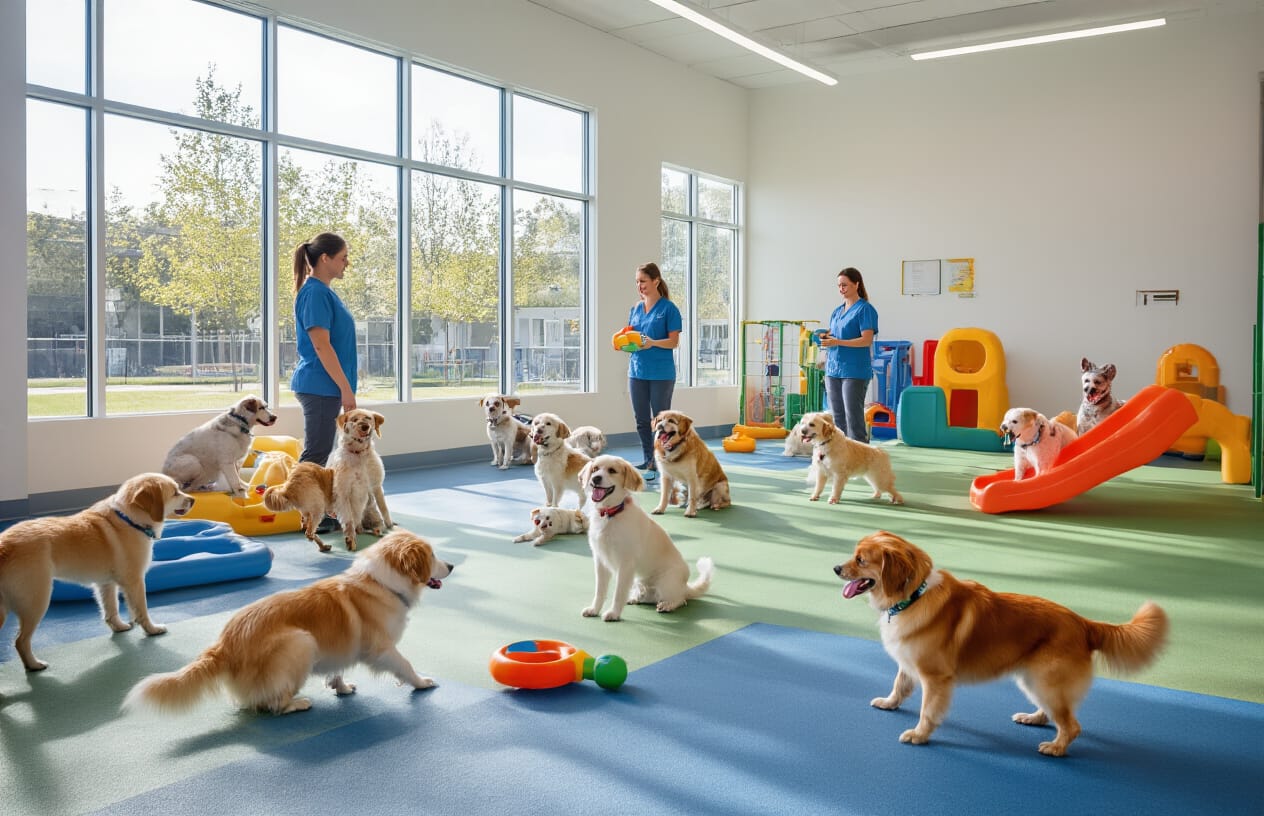
Group play sessions with size and temperament matching
Professional dog daycare facilities excel at creating balanced playgroups that maximize positive interactions while minimizing stress and conflict. Staff members carefully observe each dog’s play style, energy level, and social preferences before assigning them to appropriate groups. Small breeds like Chihuahuas and French Bulldogs benefit from playing with similarly sized companions, preventing accidental injuries that could occur with larger, more exuberant dogs.
Temperament matching goes beyond just size considerations. Guides like How to Choose the Best Dog Daycare in Manhattan: A Checklist can help pet parents understand how reputable facilities evaluate these differences to build safer, more balanced groups. High-energy dogs who love chase games and wrestling are paired with equally enthusiastic playmates, while calmer, gentler dogs enjoy quieter social interactions.
The dog daycare benefits NYC pet parents see most clearly include reduced anxiety and improved confidence. When dogs consistently have positive play experiences with well-matched companions, they develop better social skills and learn appropriate boundaries. Staff continuously monitor these sessions, redirecting overstimulating behaviors and rewarding good social choices with praise and treats.
Controlled introduction protocols for shy or reactive dogs
Not every dog arrives at daycare ready to jump into group play. Many NYC dogs, especially rescues or those with limited socialization history, need gradual, carefully managed introductions to new environments and companions. If you’re just starting this journey with your pup, Preparing Your Dog for Their First Day at Manhattan Daycare offers helpful tips to make that transition smoother and stress-free.
The process typically begins with one-on-one assessment sessions where staff evaluate a dog’s comfort level, triggers, and preferred interaction styles. Shy dogs might start by observing group play from a safe distance, gradually moving closer as they show signs of interest and relaxation. Reactive dogs receive specialized attention, working with experienced handlers who understand canine body language and stress signals.
Dog daycare socialization programs often use “buddy system” approaches, pairing anxious dogs with calm, well-socialized mentors who demonstrate appropriate play behaviors. These mentor dogs serve as confidence boosters, showing nervous newcomers that the environment is safe and fun. Staff may use barriers like baby gates to allow visual contact while maintaining physical separation until both dogs show positive body language.
Positive reinforcement plays a crucial role in these protocols. Dogs receive treats, praise, and favorite toys when they display relaxed, curious, or playful behaviors. This creates positive associations with the daycare environment and other dogs, gradually replacing fear-based responses with excitement and anticipation.
Multi-age interaction opportunities
One of the most valuable aspects of professional dog daycare involves mixing dogs of different ages and life stages. Puppies learn invaluable lessons from older, well-mannered dogs who naturally teach boundaries and appropriate play styles. Senior dogs often enjoy the gentle company of younger companions without the overwhelming energy of puppies their own size.
Young dogs between 6 months to 2 years particularly benefit from interacting with mature, stable adults who won’t tolerate rude behaviors like excessive jumping, nipping, or resource guarding. These older mentors provide immediate, appropriate corrections that help shape better social skills more effectively than human intervention alone.
Senior dogs, on the other hand, often experience renewed vitality when exposed to the gentle enthusiasm of younger companions. Many older dogs who seem disinterested in play at home suddenly perk up around respectful, well-behaved younger dogs. This intergenerational mixing also supports emotional wellbeing, and our guide on Reducing Separation Anxiety: The Role of Dog Daycare in Manhattan explains how structured daycare environments help prevent isolation and build confidence across all life stages.
Daycare staff carefully supervise these multi-age interactions, ensuring that energy levels remain appropriate and that older dogs aren’t overwhelmed by overly enthusiastic younger companions. They create separate spaces when needed and facilitate positive interactions through structured activities like training sessions, puzzle-solving games, and gentle exploration time.
Long-Term Social Improvements for NYC Dogs
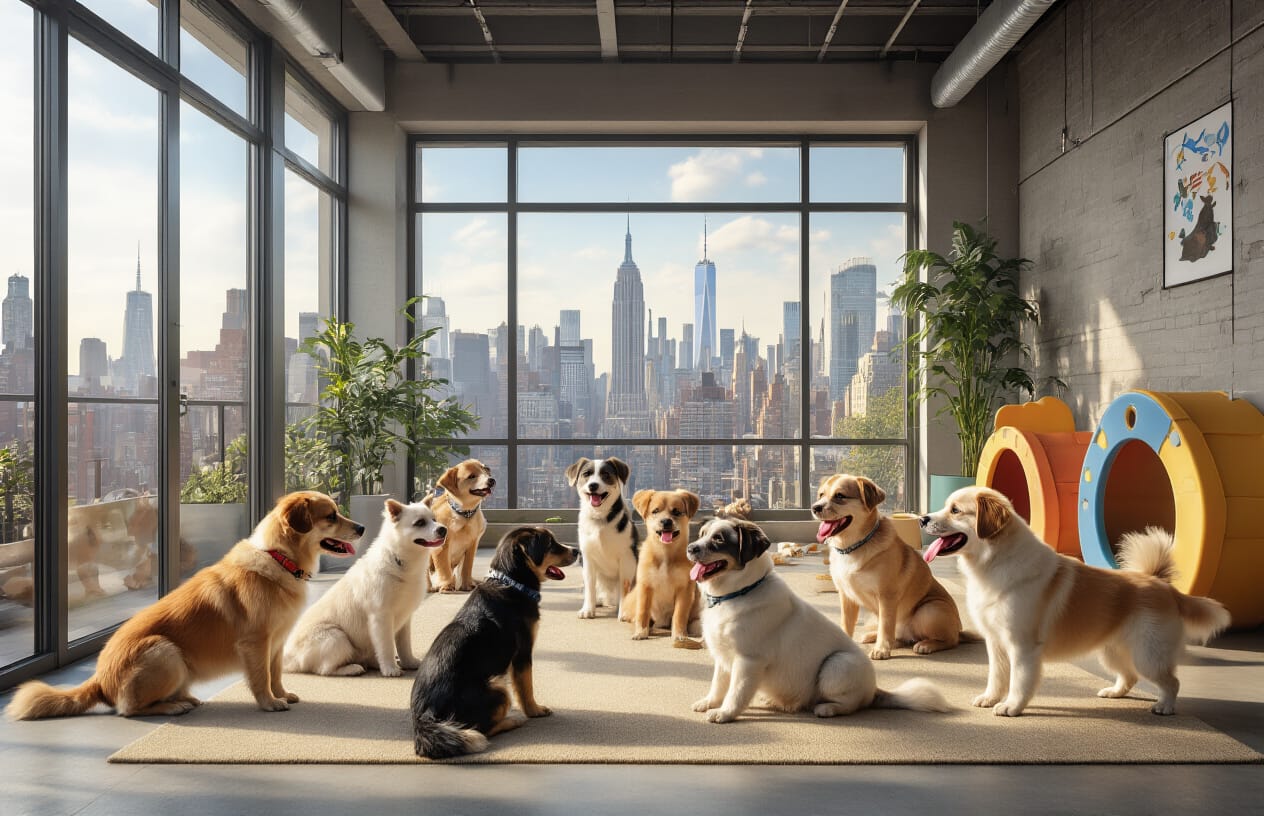
Better leash manners and street etiquette
Dogs who attend professional dog daycare benefits NYC programs develop remarkable improvements in their street behavior. Through daily exposure to structured environments and consistent correction techniques, these pups learn to walk calmly beside their owners instead of pulling or lunging at distractions. The controlled socialization environment teaches them appropriate responses to urban stimuli like sirens, honking cars, and bustling foot traffic.
Regular daycare attendance creates muscle memory for proper walking behavior. Dogs practice loose-leash walking during facility transitions and outdoor breaks, reinforcing good habits that transfer directly to city sidewalks. They learn to focus on their handlers rather than every passing squirrel or interesting smell, making daily walks more enjoyable for everyone involved.
Street etiquette extends beyond leash manners to include appropriate responses to strangers, proper bathroom behavior, and understanding traffic patterns. Dogs become more predictable in their reactions, reducing the stress both owners and pedestrians feel when encountering them on busy NYC streets.
Reduced reactivity to other dogs and people
The constant exposure to various dogs, handlers, and visitors in daycare settings dramatically reduces fear-based and excitement-based reactivity. Dogs learn that encountering new individuals doesn’t require defensive posturing or overwhelming enthusiasm. This dog daycare socialization benefit becomes especially valuable in a city where unexpected encounters happen multiple times daily.
Reactive behaviors like barking, lunging, or cowering typically stem from insufficient socialization during critical developmental periods. Professional daycare facilities address these gaps through controlled introductions and positive reinforcement techniques. Dogs practice calm greetings repeatedly throughout each day, gradually replacing reactive responses with neutral or friendly acknowledgments.
The multi-dog environment teaches appropriate play signals and boundaries. Pups learn to read other dogs’ body language accurately, reducing miscommunications that often trigger reactive episodes. They develop confidence in social situations, approaching new encounters with curiosity rather than anxiety or aggression.
Enhanced adaptability to crowded urban spaces
NYC’s dense population and constant activity can overwhelm dogs without proper preparation. Cornell University College of Veterinary Medicine explains how structured socialization and controlled exposure help dogs adapt to urban environments safely. Dogs develop coping mechanisms that help them navigate subway platforms, busy intersections, and packed sidewalks with composure.
This adaptability training includes desensitization to sudden movements, loud sounds, and close proximity to strangers. Dogs learn to maintain focus on their owners even when surrounded by distractions, making them safer and more reliable companions in urban settings. They develop spatial awareness, understanding how to move through crowds without becoming anxious or territorial.
The gradual exposure builds resilience rather than simple tolerance. These dogs don’t just endure city life—they actively engage with it confidently. They can accompany owners to outdoor cafes, farmers markets, and community events without displaying stress behaviors or requiring constant management. This transformation opens up new possibilities for shared adventures throughout the city.
Conclusion
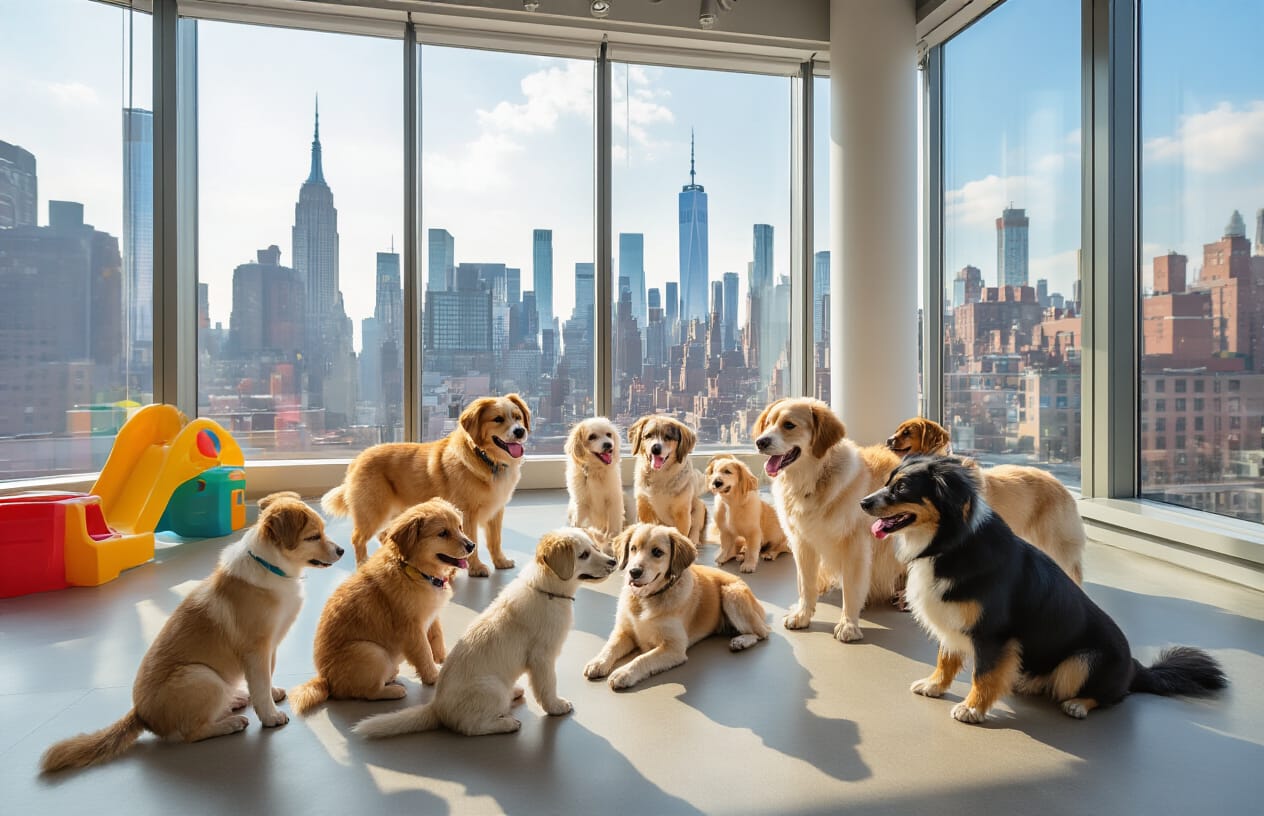
Dog daycare offers NYC pups a structured environment where they can learn essential social skills that might be harder to develop in the city’s busy streets and small apartments. Through supervised playtime, organized activities, and consistent interaction with both dogs and humans, your furry friend gains confidence, learns proper play behavior, and develops the social cues needed to thrive in urban settings. These experiences go far beyond simple exercise—they create well-rounded dogs who can handle the unique challenges of city living.
The investment in professional dog daycare pays dividends that extend well into your pup’s adult years. Dogs who regularly participate in structured social activities show better behavior around strangers, reduced anxiety in crowded spaces, and improved communication with other pets. For NYC dog owners juggling busy schedules, daycare provides peace of mind knowing your companion is not just being cared for, but actively developing into a socially confident and well-adjusted city dog.
Looking for trusted pet care services in Manhattan, NYC? At Andreia’s Dogs, we provide loving, professional care at the Upper Dogs Social Club in East Harlem, offering dog daycare, walking, grooming, and more. Let us help your pup grow, play, and thrive in a safe, nurturing environment.
Frequently Asked Questions (FAQs)
Most professional dog daycares in NYC accept puppies as early as 3 to 4 months old, provided they are up to date on core vaccinations. Starting socialization during this critical developmental window helps puppies build essential skills, such as bite inhibition, confidence around other dogs, and proper play etiquette. Adult dogs can also join daycare, especially if they need additional social exposure or are learning to navigate urban environments.
Absolutely. Dog daycare provides a structured and supervised environment where nervous or shy dogs can safely observe and interact with other dogs at their own pace. Through positive reinforcement, gradual introductions, and consistent routines, anxious dogs learn to feel comfortable, reduce stress, and gain confidence in new social situations. Over time, these experiences help them become calmer and more well-adjusted both at home and in public spaces.
Unlike dog parks, which are largely unmonitored, dog daycare offers structured socialization under the guidance of trained staff who understand canine body language and behavior. Staff ensure that playgroups are balanced by size, energy level, and temperament, and intervene when necessary to prevent conflicts. This controlled approach teaches dogs proper social cues, bite inhibition, and respectful interaction — skills that are often missed in casual park encounters.
Dog daycare is beneficial for dogs of all ages. Puppies develop critical social skills during their early months, but adult dogs, including seniors or rescues, also gain valuable mental stimulation, companionship, and behavioral refinement. Adult dogs can learn new social behaviors, improve confidence, and reduce reactivity to other dogs and people through consistent, supervised interactions.
Consistency is key for socialization and behavior development. Many NYC pet owners choose 2–3 daycare visits per week to maintain regular interaction, structured play, and mental stimulation. Frequent attendance helps reinforce learned behaviors, reduces anxiety or destructive tendencies at home, and ensures that dogs stay comfortable and confident in busy urban environments.

